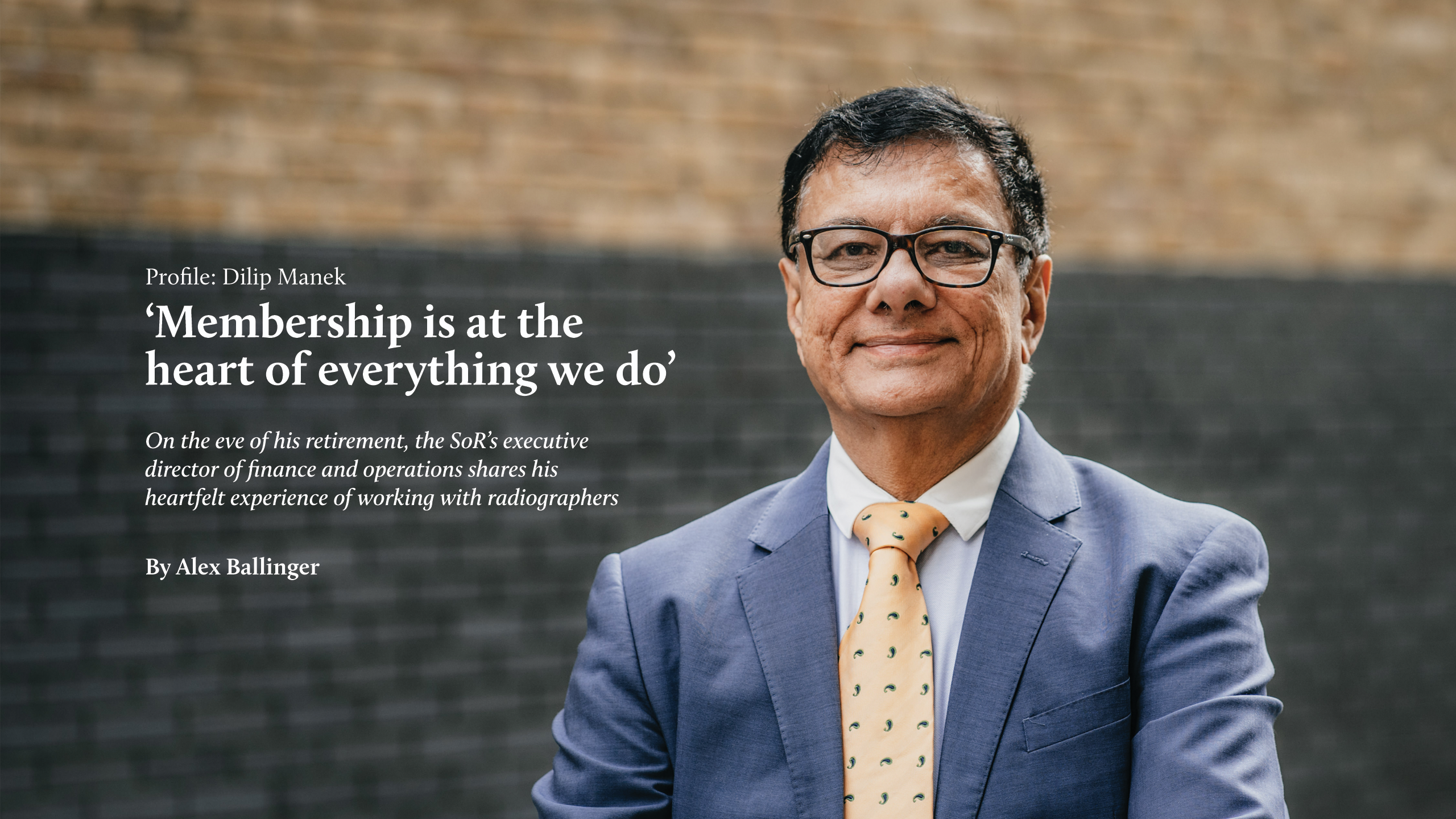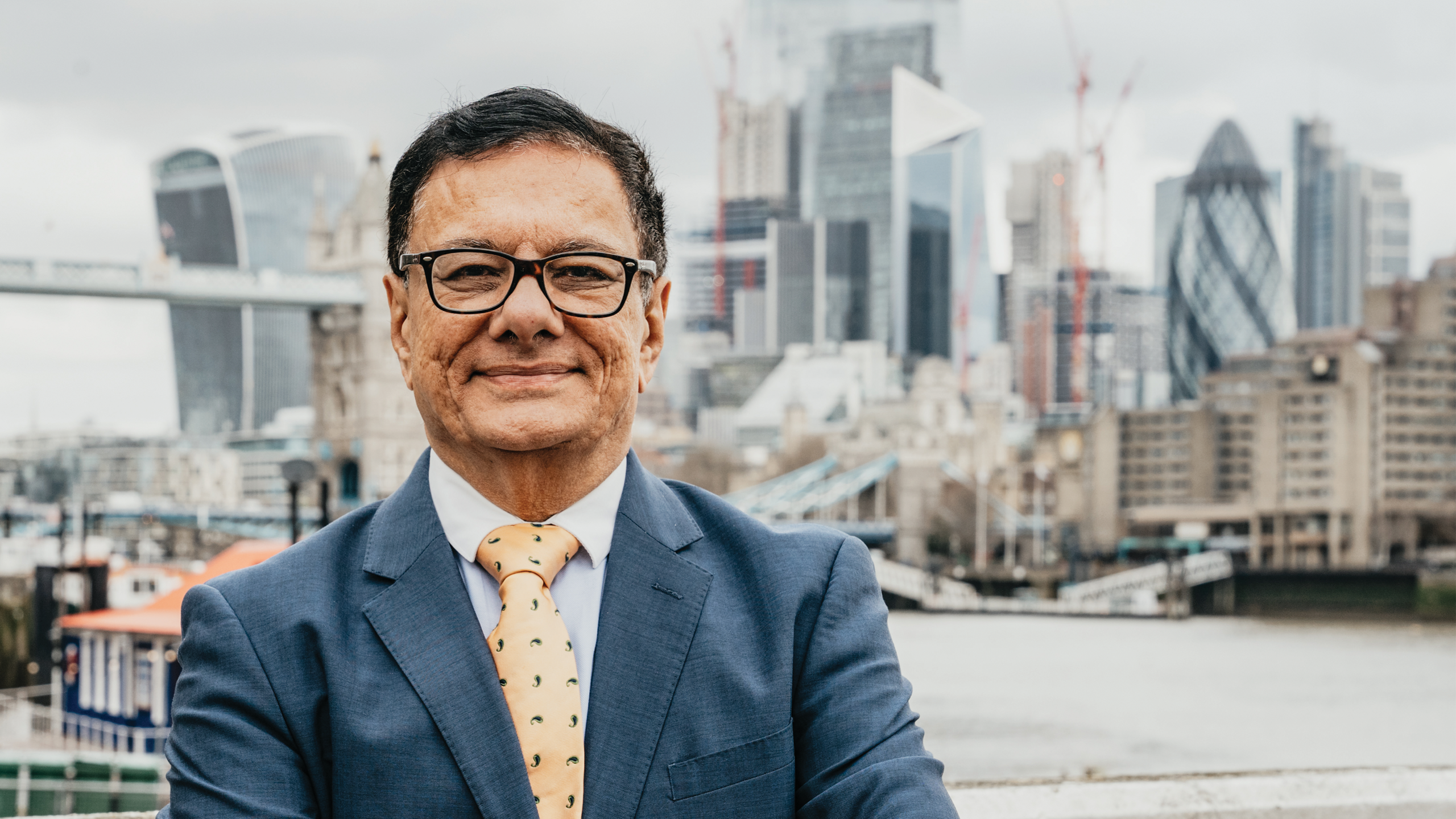
Radiographers are often present at the darkest times for patients and their families. It is providing this care that inspires many radiographers into their profession, but on occasion it will even inspire those outside of healthcare.
That was the case for Dilip Manek, executive director of finance and operations at the Society of Radiographers. Dilip, who will be retiring from his role at the end of 2024, joined the society in 2018, inspired by outstanding care from radiographers that he witnessed first hand.
As Dilip’s time with the society comes to a close, Synergy caught up with him to discuss his inspiration, the future of the SoR and the impact the radiography profession has had on his life.
Against the odds
“My reason for joining the Society and the College of Radiographers was a sad but very motivational episode,” says Dilip. “My sister, Usha, was a nurse, and at the age of 48 she was diagnosed with secondary breast cancer. Her prognosis was bleak – her colleague, a professor she worked with, told her she didn’t have long to live, and that no treatment or medication could alter that outcome.”
Usha was given just six months to live after her diagnosis, but after seeking a second opinion she decided to undergo chemotherapy and radiotherapy. Against all odds, Usha survived for 13 years, before sadly passing away in 1999.
Dilip says his sister’s life had an enormous impact on his family, particularly inspiring those around her to help people who are less fortunate. Dilip became the president of his local Lions Club and raised £20,000 in a single night, using the funds to contribute towards stem cell therapy research for cancer. He also served as a trustee for the Paul Strickland Scanner Centre, an independent medical charity, for nine years. Dilip’s daughter went on to become a GP inspired by the care Usha received and was awarded a British Empire Medal, his son focused on his volunteer work and became a police sergeant, and Dilip’s wife supports national and local charities, including Great Ormond Street Hospital in London.
But there was one detail during Usha’s care that always stuck with Dilip: her oncologist would often say ‘let us see what the radiographer has to say’. This would come to inspire Dilip’s decision to join the Society of Radiographers when the director of finance role became available in 2018.
Against the odds
“My reason for joining the Society and the College of Radiographers was a sad but very motivational episode,” says Dilip. “My sister, Usha, was a nurse, and at the age of 48 she was diagnosed with secondary breast cancer. Her prognosis was bleak – her colleague, a professor she worked with, told her she didn’t have long to live, and that no treatment or medication could alter that outcome.”
Usha was given just six months to live after her diagnosis, but after seeking a second opinion she decided to undergo chemotherapy and radiotherapy. Against all odds, Usha survived for 13 years, before sadly passing away in 1999.
Dilip says his sister’s life had an enormous impact on his family, particularly inspiring those around her to help people who are less fortunate. Dilip became the president of his local Lions Club and raised £20,000 in a single night, using the funds to contribute towards stem cell therapy research for cancer. He also served as a trustee for the Paul Strickland Scanner Centre, an independent medical charity, for nine years. Dilip’s daughter went on to become a GP inspired by the care Usha received and was awarded a British Empire Medal, his son focused on his volunteer work and became a police sergeant, and Dilip’s wife supports national and local charities, including Great Ormond Street Hospital in London.
But there was one detail during Usha’s care that always stuck with Dilip: her oncologist would often say ‘let us see what the radiographer has to say’. This would come to inspire Dilip’s decision to join the Society of Radiographers when the director of finance role became available in 2018.
A unique story
Born in Kenya, Dilip moved to the UK in the mid-1970s as a British citizen. It was here that he embarked on his career in finance, studying for the Association of Chartered Certified Accountants (ACCA) qualification, which he completed in 1984.
Dilip was later awarded his fellowship of the ACCA in 1989, and went on to study a Masters’ degree in charity accounting and financial management at South Bank University in 2001. He was awarded distinction for his dissertation, on the topic of motivation for giving to cancer charities. “My career ranged from working initially in the commercial sectors, from large organisations to medium and small companies in various sectors,” he says. “This, while challenging, as I was studying for professional qualification at the same time, was very helpful as I learned ‘on the job’. It also developed my business acumen, which included strategic, financial, resources management and people management skills.”
In 1995, Dilip made his move into the healthcare sector, joining the Royal College of General Practitioners (RCGP), where he would spend the next 19 years. In that role, Dilip helped grow the membership and the annual income significantly, served as acting CEO for six months and also co-led on the successful move to the RCGP’s £78m HQ in Euston, London.

A unique story
Born in Kenya, Dilip moved to the UK in the mid-1970s as a British citizen. It was here that he embarked on his career in finance, studying for the Association of Chartered Certified Accountants (ACCA) qualification, which he completed in 1984.
Dilip was later awarded his fellowship of the ACCA in 1989, and went on to study a Masters’ degree in charity accounting and financial management at South Bank University in 2001. He was awarded distinction for his dissertation, on the topic of motivation for giving to cancer charities. “My career ranged from working initially in the commercial sectors, from large organisations to medium and small companies in various sectors,” he says. “This, while challenging, as I was studying for professional qualification at the same time, was very helpful as I learned ‘on the job’. It also developed my business acumen, which included strategic, financial, resources management and people management skills.”
In 1995, Dilip made his move into the healthcare sector, joining the Royal College of General Practitioners (RCGP), where he would spend the next 19 years. In that role, Dilip helped grow the membership and the annual income significantly, served as acting CEO for six months and also co-led on the successful move to the RCGP’s £78m HQ in Euston, London.
Continuing to inspire
This journey then led Dilip to the Society of Radiographers. “My tenure at the Society of Radiographers culminated in the mantra that membership is at the heart of everything we do,” he says.
“This is something we encourage all those associated with the organisation to work collaboratively to ensure we support, grow, recruit and retain our members. One great example is the microsite developed during Covid to support members.”
Radiography professionals continued to inspire Dilip during his time with the SoR. “I am a firm believer in relationship building and networking with members,” he says. “The big events I go to are our Annual Delegates Conference (ADC) and the UKIO. This is a great opportunity to engage with members and listen to their positive experiences, their concerns and how we can enhance the benefits we currently provide. It is also enriching to engage with members during the AGM to provide members assurance on our governance and finances.”
On his proudest moments with the SoR, Dilip says Synergy receiving a prestigious award for best association magazine at the 2023 Association Excellence Awards, held in London, was among the highlights, alongside the seamless support the SoR offered members during the Covid pandemic and popular initiatives for members, such as the RADIATE wellbeing programme.
He was also particularly proud of leading the organisation’s first staff wellbeing day, held in summer 2024, giving all SoR staff the first real opportunity to energise and connect in-person since the pandemic.
"I'd like to thank members for their innovation and tenacity"
The future for the SoR
While he may be heading for retirement, Dilip is also passionate that the SoR continues to develop its outstanding support for members: “We continue to invest in the technology and infrastructure of the SoR | CoR to ensure we can offer the best support to our members. Some key investments include the development of the website, improvements to our publications and the introduction of a Technology Roadmap. A notable part of our digital transformation programme includes the digitisation of Synergy and the live streaming of the ADC, along with the accompanying event app.
“As part of the Technology Roadmap, we are also planning a major investment in new customer relationship management software for our membership. This will enhance the membership experience and streamline our processes."
During Dilip’s time at the SoR, membership has continued to grow, from 27,000 members in 2019 to more than 30,000 in 2023. But the increasing membership, at a time of financial difficulty, has presented its own challenges, and resulted in the SoR making changes to its membership and subscription structure, as decided by the society’s UK council. “Our long-term strategy on membership subscriptions is to ensure that we maintain smaller, regular levels rather than levels that vary significantly each year by taking various factors into consideration,” he explains.
“We are planning changes to our upcoming membership structure and subscription fees to better support student members, newly qualified radiographers in the early stages of their careers and the support workforce.”
The SoR recently announced that its membership costs will be increasing for most members from 1 October 2024.
While the increase will be modest – no more than £1 per month for most members – it is an essential step to ensure we can continue improving the services it provides. This will help it to invest in resources that benefit members, including enhanced support systems, upgraded digital infrastructure and initiatives aimed at expanding the SoR’s influence within the profession.
Find out more about the subscription changes and your benefits here.
Looking ahead to his retirement and reflecting on his career, Dilip says: “While I look forward to the next chapter of my life and enjoy retirement with my family, I want to offer my sincere gratitude for all the opportunities created for me and the contribution I was able to make at the Society and College of Radiographers. I have many great memories of my time at SoR | CoR as the executive director of finance and operations and will miss working with you all.
“Finally, it is fitting to thank members for their continued innovation and tenacity in the face of ongoing challenges, particularly during the pandemic. I hope you all continue to make a difference to all the patients you support.”
More about SoR membership
The SoR is the organisation that truly represents the interests of radiography professionals. Membership is open to anyone working in clinical imaging, radiotherapy or oncology. By joining the SoR, members gain access to a wide range of benefits, including expert representation, extensive CPD support and valuable guidance for career progression.
Read more about the benefits of membership here.
Read more



